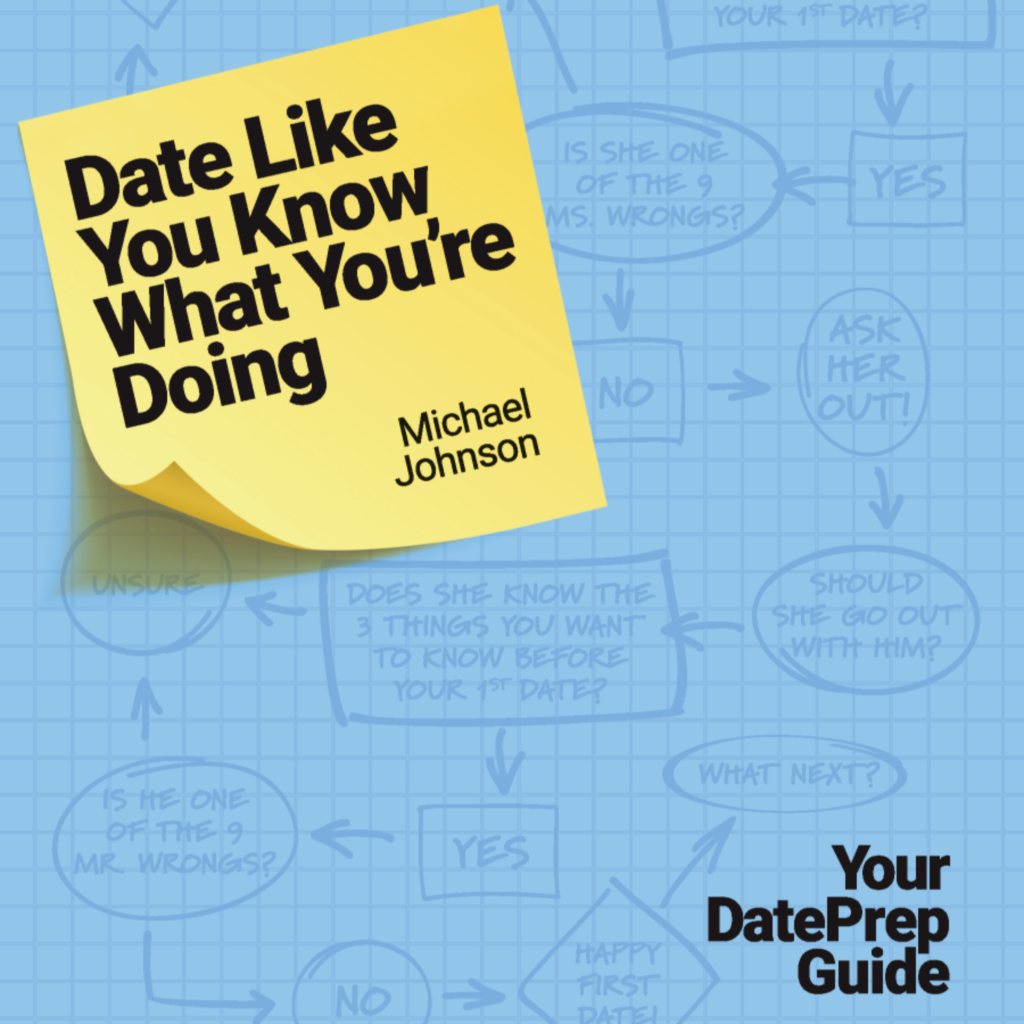Want to get to know someone on a date?
For starters, we suggest getting to know them prior to the first date, and to help you do just that we share two tips in the LoveEd video above, but here’s just one quote:
Live in the moment. Focus your attention on the person you’re actually with, not the person you’re hoping they will become.
But after you’ve gotten to know someone a little before dating, how do you get to know that person on an actual date?
We talk about that in great, practical detail in our book, Date Like You Know What You’re Doing: Your DatePrep Guide. Speaking of, here’s just a portion pulled directly from that book:
DTP Talk #1: Reputation
 We acquire reputations for a reason: we build them, one choice at a time.
We acquire reputations for a reason: we build them, one choice at a time.
This is important to remember when you’re dating with the goal of marriage, because…
If you marry someone you will have to live with their choices for the rest of your life. So, you need to know the reputation of the person you’re dating.
For starters, you want to make sure they don’t already have a reputation for being any of the nine Mr. or Ms. Wrongs we discussed in Chapters 4–6. Beyond asking: watch, pay attention, and observe the person—not in a stalker kind of way—but in a prudent kind of way. As you do, consider any of the following questions:
- Do they demonstrate a passion for Christ in their speech and behavior?
- Are they known for spiritual courage or compromise?
- Can they hold their tongue?
- Are they more likely to be self-deprecating, self-promoting, or not thinking of themselves at all?
- Emotionally, do they come across timid, careful, wise, courageous, carefree, or reckless?
- Intellectually, do they come across illiterate, naïve, well-informed, persuasive, opinionated, or obstinate?
- Do they demonstrate a growth mindset that enjoys learning and experiencing new things?
- When it comes to stewarding their possessions, do they tend to be careless, sloppy, clean, meticulous, or OCD?
- Do they take good care of their bodies through diet and exercise?
- Are they tightfisted, thrifty, generous, or wasteful with their money?
- What’s the reputation of their friends and associates?
- In their social circles, do they tend to control, lead, follow, or challenge?
- Are they more well-loved, respected, appreciated, tolerated, or avoided?
- Are they dependable or flaky?
- How do they respond to correction? Do they reject it, take offense to it, ignore it, appreciate it, or act on it?
- Will they confront someone in the wrong? And if so, do they do so fearfully, confidently, graciously, abruptly, or arrogantly?
- With conflict, do they tend to escalate it, enjoy it, address it, tolerate it, avoid it, or fear it?
- With offenses, do they tend to stuff their feelings, forgive, or hold grudges?
- What is their dating history and is it readily known by those who know them?
- Is their approach to dating more impulsive, flippant, casual, intentional, anxious, overbearing, or desperate?
- Do they date around a lot?
- Do they tend to rush into serious relationships?
- Are they known for leading people on or leaving people hanging?
- Do they jump from serious relationship to serious relationship?
For that matter, how would you answer the previous questions for yourself?
Online Versus in Real Life
While we’re on the subject of reputation, we can’t overlook someone’s online profile, so carefully consider where and how they present themselves online.
Of course, our online image often differs from who we are In Real Life (IRL). Moreover, we will often present ourselves differently even between online platforms (one’s online dating profile could be very different from their Twitter posts which could be very different from their Instagram stories).
Some of this can be explained by the differences between the platforms. However, there’s often more behind this reality, so here are just two contrasting tendencies to watch out for when stalking someone (in a Christ-like way) online:
- Idealization: Their online profile may be more idealized because they want to present a version of themself that either they believe others will like more or they wish they were. Or both.
- Impropriety: Their online behavior may be more vulnerable, imprudent, abrasive, or even crude since they are able to “hide behind a screen.”
That said, if you notice a symmetry between the way someone presents themselves online and IRL or even a constancy between someone’s various online profiles, that is compelling evidence of a person secure in who they are and who they are striving to become.
A True (and Very Sad) Story
“I’ve never seen him like this before!”
“He’s changed so much since he met you!”
“He’s like a totally different person now!”
Those words from Barry’s (not his real name) family and friends made Sandy (nor her real name) feel so good, so special. As if the way Barry treated her didn’t make her feel special enough.
Those sweet words were also the only warning she had that her future marriage would turn out to be a fantastic disaster.
Frankly, it wasn’t bad being the person responsible for changing a man for the better. She seemed like a superhero amongst his family and friends. (And it’s important for family and friends to support your relationship, right?)
But after Barry and Sandy said, “I do,” in front of all those approving well-wishers, Sandy discovered Barry wasn’t done changing.
Only now he changed back to the flaming narcissist he had been known as prior to meeting Sandy.
Even worse—devastatingly so—Barry quickly made it clear he had married Sandy only for her money. He didn’t even want to have sex with her. (He had porn to take care of those urges.)
The moral of this relational horror story: reputation matters.
What About Second Chances?
Can people change? Certainly. Can they experience dramatic change? Absolutely!
Every day, star-crossed lovers change dramatically. Formerly depressed, lonely, broken, and empty, the power of romance turns their frowns upside down, heals every hurt in their hearts, and fills their lives with love and meaning.
Of course, people change for other reasons, more significant and lasting than infatuation, but the sad reality is that many dramatic changes aren’t permanent ones. Think about someone who suddenly loses a lot of weight or comes into a lot of money.
Remember, people garner reputations for a reason.
So if you find yourself in Sandy’s position in the previous story, STOP.
First, dig in deep to discover precisely who your love interest used to be and what has brought about such significant transformation. If the change is sincere, they should be very open about recounting who they once were and delight in sharing the details of their transformation. In contrast, watch out for both of these extremes:
- Shame—Are they embarrassed to admit their past sins? Do they appear to be free of that guilt, or do they still seem bound by it?
- Pride—Does their confession sound more like bragging? Do they take full responsibility for their past or do they try to whitewash or excuse certain behaviors?
Don’t just take their word for it. Consult those who know them best. Then, if you discover you’re the apparent catalyst for their life change? RUN!
If someone has changed overnight in a permanent way, it can only be the result of a profound life experience. As much as we’d all like to be the “profound life experience” of someone else, odds are we won’t be.
If the change is genuine, it will be proven over time. So give it time. Indeed, if your beloved has truly changed, they shouldn’t be offended that you want to take a year or more to make sure. No rush. Remember love is first and foremost patient. Oh yeah, and remember, reputation matters.
That said, reputations are not always reputable. That’s why you need to advance to DTP Talk #2.
DTP Talk #2: Character
Reputation is who others think you are, but character is who you really are. While you might date someone for their reputation, if you end up married to them, you will have to live with their character. Every day. Until one of you dies.
In a perfect world, someone’s reputation would naturally flow out of their character. However, in the real world…
Someone projecting a sterling reputation could be hiding secrets which suggest a character that’s anything but sterling.
Sadly, this possibility is even more likely inside the church community where bad behavior is less tolerated. This means you may not get any warning from friends and family saying things such as, “They’ve changed so much since they met you!” Therefore, you must be willing to take the time and do the hard work necessary to discern the true character of the person you’re dating.
How to Determine Someone’s True Character
The saying goes, “character is who you are when no one’s watching.” But how are you supposed to find out who someone is “when no one’s watching” while you’re watching them?
Honest answer? You can’t.
But don’t let that discourage you! Let that inspire you to do two things:
- Take. Your. Time!
- Pay. Attention!
Sad truth: most people date with their eyes half closed and then when they get married and the power of limerence fades, their eyes are opened, and they see the character issues they ignored when they were dating.
(And that’s another reason why we have divorce.)
So, in honor of dating with your eyes wide open, here are a plethora of questions for you to address over time.
Relational Questions:
- How do they treat people in authority? Do they resent them or respect them?
- How do they treat people who are serving them or work for them? Do they disparage them or treat them with dignity?
- Do they talk about people behind their backs? In front of their backs?
- How do they talk about their past loves? Was everything their ex’s fault?
- How do they talk about their family, especially their parents (or the people who raised them)? Do they tend to idolize, admire, or criticize them?
Emotional Questions:
- How well do they respond to disappointment? Do they sulk, rage, or whine?
- How do they respond to success? Do they brag? Slack off?
- What are their fears? Do they center around money, career, family, health, or zombies?
- How do they deal with their fears? Do they tend to worry about them, suppress them, or face them?
- From where do they seem to draw their strength: from within, from the approval and support of others, or from an authentic relationship with God? How can you tell?
Material Questions:
- Are they responsible with money? Carry debt thoughtlessly? Spend frivolously? Give generously? Save frugally?
- Are they responsible with time? Plan? Flexible? Waste it with hours of entertainment? Invest it in reading and watching FMU material?
- Are they responsible with possessions? Are they obsessive or careless? Do they hoard or do they share?
- In all these areas do they tend to act more like stewards, owners, or renters?
Integrity Questions:
- How open are they about admitting their “rough spots”? Do they appear more defensive, humbly honest, or blissfully unaware?
- How do they deal with their character deficiencies? Do they seem more passive, apologetic, or intentional about taking steps to change?
- Do they learn from their mistakes and subsequently break recurring patterns of failure, or do they just seem to repeat them?
- Can they share a past struggle where they have found victory or at least measurable and sustainable progress?
I know that’s a lot of ground to cover, and most people don’t learn the answers to most of these questions until after marriage. And that’s another reason we have divorce. But that won’t be your story.
Of course, if all the above questions were on a test, most of us (perhaps all of us) would flunk, but that shouldn’t mean you just throw caution to the wind, close your eyes, and kiss. That’s how our culture wound up in this mess.
[The above post is an excerpt right from Date Like You Know What You’re Doing: Your DatePrep Guide. I wrote it to empower YOU to grow spiritually and date wisely so you can marry well. Check out the book and video curriculum here. Or watch this video and THEN click the previous link.]
Questions You Need to Answer about Your Date (Without Asking)
Great Questions for Great Dates (Part 2: Values & Convictions)





